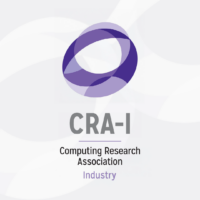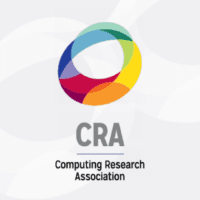Policy Spotlight: Stephanie Forrest, Arizona State University
By CRA Government Affairs
As part of CRA’s mission to help the computing research community become more aware and engaged in the policymaking that affects our field, Computing Research News’ Q&A series, Policy Spotlight: Conversations with Computing Researchers, highlights the work that community members are doing in governmental roles or who have taken part in CRA Government Affairs activities. This series allows you to hear directly from policy-minded members of the community, in their own words, to highlight work that the community should know about and raise awareness of the types of opportunities available to those interested in serving.
 This edition features Stephanie Forrest, Director of the Biodesign Center for Biocomputation, Security and Society at Arizona State University, and a leading figure in computing research. Dr. Forrest served as the Government Affairs Committee Chair at CRA from 2016 to 2024. Over her eight-year tenure as chair, Dr. Forrest has been instrumental in guiding CRA’s policy and advocacy efforts, ensuring that the voices of the computing research community are heard at the national level. Dr. Forrest has experience as a policymaker herself, as a Jefferson Science Fellow at the U.S. Department of State in 2013-2014 where she worked on cyber policy.
This edition features Stephanie Forrest, Director of the Biodesign Center for Biocomputation, Security and Society at Arizona State University, and a leading figure in computing research. Dr. Forrest served as the Government Affairs Committee Chair at CRA from 2016 to 2024. Over her eight-year tenure as chair, Dr. Forrest has been instrumental in guiding CRA’s policy and advocacy efforts, ensuring that the voices of the computing research community are heard at the national level. Dr. Forrest has experience as a policymaker herself, as a Jefferson Science Fellow at the U.S. Department of State in 2013-2014 where she worked on cyber policy.
In this Q&A, she discusses her work with the committee, the initiatives she has led, and her vision for the future of CRA’s engagement in government affairs.
Can you tell us about your role as the Chair of the CRA Government Affairs Committee and what your responsibilities were during your tenure?
The Government Affairs Committee, or GAC, is charged with representing the computing research community in Washington D.C., conveying the importance of computing research, tracking and influencing relevant policy and legislation, and helping our community participate in policy making. Much of the GAC’s work comes in the form of asynchronous requests to comment on pending legislation, participate in rule-making processes, or provide more informal input about a particular topic or proposal. As Chair, I worked closely with our policy staff, Brian Mosley and Peter Harsha, to triage these requests, consult with the full committee, process the committee and community inputs, and then draft written materials. We also host several regular events throughout the year. These include: virtual town halls open to our members, which are devoted to a particular policy issue; the biennial Leadership in Science Policy Institute (LiSPI) workshop for computing professionals interested in policy work; and an active policy blog to keep members up to date on the latest developments in D.C.
What inspired you to take on this leadership role within CRA, and how did your perspective on interplay between computing and government policy evolve over the years you served?
Soon after I joined the CRA Board, the role found me when the previous GAC Chair rotated off the CRA Board. I had recent experience working at the State Department on policy, which gave me insight into how government works and why policy making is so important. Many of our current technological plagues arose because the people developing and marketing technology were isolated from those who actually use or are affected by it on a daily basis. I continue to be motivated by the need for computer science researchers to interact directly with the policy-making process.
During your eight years as chair, what do you feel was the most impactful or memorable accomplishment for the committee?
Impact in this space is very difficult to measure. Policy-making in the U.S. government is about process. This is challenging for computer scientists to grasp, who are used to tackling goal-directed projects. For example, most of us would likely agree that having a free and fair election is more important than which candidate is elected, regardless of how strongly we feel about particular choices. Just as it is important to vote, so it is important to participate in formulating policy. However, here are a couple of examples of the work we do.
Keeping with the election theme, in 2019 the Election Technology Research Act was proposed, and in 2020 CRA was asked to sign on to two letters, both opposing proposals to allow Internet-based voting during the pandemic. The issue wasn’t specifically about computing research, so the decision was not obvious. We ultimately decided that the issue was important, and that our technical expertise would be informative, so we signed the letters.
A second example concerned an agency research security initiative which targeted researchers with foreign connections working on federally-funded research projects. In summary, the initial instructions required research organizations to categorize researchers into different risk categories, and the criteria were overly severe. For example, it seemed that any U.S. researcher could be labeled ‘high risk’ if they were of Chinese descent, or even had Chinese friends. In response, a subset of the GAC met with the authors of the policy and voiced our objections and suggestions. The subsequent version of the instructions is considerably more reasonable.
What were the biggest policy challenges you faced while leading the Government Affairs Committee, and how did you address them?
When I started in 2016, most of our work involved advocating for computing research funding—a generally uncontroversial activity that we understand well. Since then, there have been several sea changes, which have collectively increased the volume and diversity of issues that the GAC considers. In particular, government concerns about research security, CRA’s change of mission to include socially responsible computing and the explosive rise of interest and activity in AI, have all contributed to an expanded and more complex policy landscape.
How did CRA’s Government Affairs Office adapt during your tenure to tackle emerging issues like artificial intelligence and research security? Were there any politically challenging situations to deal with?
The Office itself has been remarkably stable, although our policy staff, Brian and Peter, are working harder than ever, and we’ve had to be more selective about the issues on which we can engage. We are fortunate to have their perspective and expertise as the GAC members come and go. Politically challenging situations do arise, most often when our opinions about an issue either don’t align with the larger community’s consensus or when our position would exacerbate a partisan debate. Over the years, we have worked hard to establish a reputation for non-partisanship, deep technical expertise, and trustworthiness with sister organizations and government.
What advice would you give to computing researchers interested in becoming more involved in policy, advocacy, or serving in governmental roles?
CRA runs a biennial workshop called the Leadership in Science Policy Institute (LiSPI) to help computing researchers learn about the many ways they can become involved with policy. We also organize an annual Congressional Fly-in (known as Congressional Visit Day), which is a great way to dip your toe in the water, meet people, and learn about the policy landscape. There are a number of fellowship programs that place researchers in government agencies, which is how I went to the State Department. Finally, many state legislatures are actively considering legislation related to computing, in particular, privacy and AI. Getting involved at the state level can be very rewarding, as I learned years ago when I helped draft a bill related to computer science education in the state of New Mexico, testified about its importance, and then saw the bill enacted into law.
What are your hopes for the future of CRA’s policy and advocacy work, and how can members of the computing research community continue to support these efforts?
Of course, I hope that CRA will continue to play an influential role in policy related to computing research and through that work enhance the computing research ecosystem. Part of that work will include incorporating industry (CRA-I) and socially responsible computing perspectives into policy positions. More broadly, digital technology has improved many people’s lives, but increasingly we see problems related to inequality, climate change, privacy and civil liberties, democratic processes, and psychological effects. Although CRA and the GAC can’t own all of these problems, I do hope that our advocacy efforts help the government and research community make decisions that move us in a positive direction.









